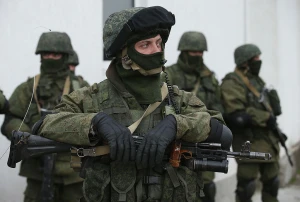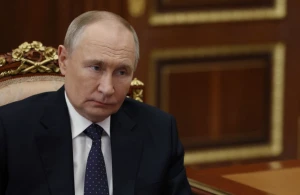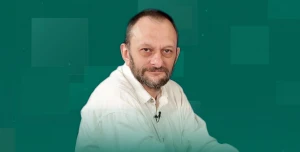
No doubt Navalny's murder was planned
Russia's war with Ukraine, which led to Russia's final break with the West, has changed Putin's views on how he should deal with his political opponents. The murder of Alexei Navalny in a penal colony demonstrated that Putin will stop at nothing
The death of Alexei Navalny has been called a political assassination from the very first minutes this tragic information emerged. Among those who made such assessments are heads of state, international organizations, leading politicians, journalists, and civil society activists, including President of Ukraine Volodymyr Zelenskyy. Many say that Navalny's murder is a sign of how Russia has changed. This can be seen in the reaction of German Chancellor Olaf Scholz.
But I would like to remind you that in Russia with which the West was still trying to maintain some kind of relationship, and in Russia that was trying to maintain relations with the West itself, as you know, they also tried to poison Alexei Navalny with this very Novichok poison that was used to kill Putin's opponents in many countries of the civilized world. We don't know how many of these murders there were, or how successful the Russian foreign intelligence service was in different countries because we only know about the failures of intelligence officers or situations where they failed to hide the poisonous substance after the death of the deceased. For example, this was the case with Alexander Litvinenko.
However, to be sure, Putin's authoritarian Russia of the time was different from Putin's totalitarian Russia, which would like to hide the results of its crimes and never recognize them. That's why, after the attempted poisoning of Alexei Navalny, Vladimir Putin allowed him to go to Germany for treatment after a personal request from then-Chancellor Angela Merkel. It is clear why he allowed it because Putin did not want to disrupt the construction of the last stage of the Nord Stream 2 gas pipeline, which he needed for energy influence in Europe, to reduce the risks of the final destruction of our country by Russian troops and to create a puppet regime in Ukraine.
But now everything is completely different. Now Putin is acting defiantly, he is not interested in the West's reaction and attention to his crimes.
And this is what makes Putin's totalitarian Russia different from his authoritarian Russia. In that authoritarian Russia, people were also killed demonstratively.
Let us recall the death of Boris Nemtsov, the former First Deputy Prime Minister of the Russian Federation and one of the most charismatic opposition politicians, right outside the windows of the Moscow Kremlin, as if Putin himself was watching his opponent's death through binoculars.
Let us recall the murders of journalists who criticized the Putin regime. This was also a demonstration of power and contempt for those who dare to have a different opinion about Russian political reality. And, of course, let us recall the total corruption of the Russian regime, which Alexei Navalny himself, his associates, and the previously murdered Boris Nemtsov have repeatedly spoken about.
But in all of these situations, the Russian authorities pretended that they had nothing to do with it. There were trials, commitments to find the perpetrators, and sentences, although even now many doubt that the real killers were in the dock. Of course, there are serious doubts that we will ever find out who really ordered the murders, because then we will have to go to the offices in the Kremlin, the FSB, the Russian Foreign Intelligence Service, and other governing bodies of the terrorist state.
Russia's war with Ukraine, which led to Russia's final break with the West, has changed Putin's views on how he should deal with his political opponents. Therefore, no matter what the Russian official press and the Kremlin's intelligence services say about what happened to Alexei Navalny, there is no doubt that it was a planned assassination.
Let's not even talk about poison. The very attitude towards Navalny during his imprisonment, in principle, implied the possibility of his early death, i.e. either murder or planned death, bringing him to death. And we know perfectly well the name and surname of the person who ordered this - Russian President Vladimir Putin. I think no one has any doubts.
Of course, I cannot call myself a political supporter of Alexei Navalny, if only because I am not a Russian citizen, and Russians choose their heroes. I did not like many things about the politician's activities. I did not like it when he said that he could not solve, so to speak, the Crimean issue, although I think today most Ukrainians have realized the legal trap Putin has driven both Ukraine and Russia into. And the only way to regain control over the Ukrainian territories occupied by Russia is by force, and the political way to achieve such changes will require long and difficult decades of constant Ukrainian-Russian conflict. And this is what Putin sought when he decided to annex Crimea, Donetsk, Luhansk, Zaporizhzhia, and Kherson regions.
And we all have to be prepared for the fact that if the Ukrainian army fails to liberate our territories, we will face decades of hard struggle and serious problems with the neighboring state. I believe that any Russian opposition politician should clearly recognize the real legal status of Crimea.
I didn't like the so-called smart voting because I always believed that the Russian political system consists of twin parties, especially after Crimea. And there is no difference between United Russia and Just Russia, and the Communists or anyone else admitted to the Russian State Duma. And the idea of "vote for everyone but the United Russia party" looks more like political naivety.
However, in the political stalemate that Russia has been in for the past decade, it would have been possible to make lesser mistakes.
In any case, Alexei Navalny was the most vocal and charismatic opponent of Vladimir Putin. It is obvious that Putin was annoyed by the accusations of corruption, because this is something that authoritarian and even totalitarian rulers hate to hear about themselves, trying to prove that they have devoted their entire lives to their dear people.
The murder of Alexei Navalny in the colony demonstrated that Russian President Vladimir Putin will stop at nothing.
We are always trying to look for some kind of gradation in the actions of the Russian leader. Where is the red line for Putin, where he can stop? The murder of political enemies? War? A nuclear nightmare? Friends, there is no such red line. When you look at Putin, you have to be sure that this man is capable of any act that threatens our lives, the lives of his compatriots, and the existence of the world itself. To prove his ambitions, this man is not ready to stop. This is not the first time I have said this.
I have answered unequivocally before when I was asked whether Putin would be ready for a so-called major attack on Ukraine. Then, as now, I said the same words: Vladimir Putin will stop at nothing, and everyone who lives in areas that are potentially vulnerable to his attacks needs to prepare psychologically for this. Now, amid Alexei Navalny's death, I repeat these important words to you again.
The strategy of victory over Russia, the tactics of survival of the Ukrainian people when we are dealing with a brutal regime that is ready to kill its political opponents for show, is a guarantee that the Ukrainian state is able to survive in the fight against a mean, insidious, cruel nuclear power that is ready for anything.
About the author. Vitaly Portnikov, journalist, winner of the Shevchenko National Prize of Ukraine.
The editors don't always share the opinions expressed by the authors of the blogs.
- News














































